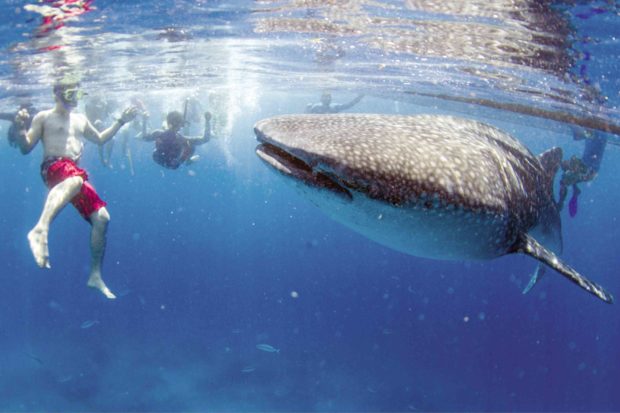Whale shark caught in fishing net freed in Quezon

INTERACTION Whale sharks, which feed in waters around the Philippines, are known to be “gentle giants” of the sea and do not pose danger to humans. —FERDINAND EDRALIN / CEBU DAILY NEWS
LUCENA CITY––A three-meter long whale shark (Rhincodon typus) was released to sea on Tuesday after getting trapped in a fishing net in Lamon Bay off Atimonan town in Quezon province, the Department of Environment and Natural Resources (DENR) reported Wednesday.
Ann Hazel Javier, senior communications development officer in DENR-Calabarzon, said in a statement that coastal residents spotted the whale shark around 10 a.m. while entangled in a fishing net near the shoreline of Barangay Angeles.
At least 30 fishermen and some villagers worked together to free the gentle marine giant, which had no visible injuries, back to the sea.
Nilo Tamoria, DENR-Calabarzon director, said the presence of the whale shark in the area may indicate a “rich marine biodiversity.”
“We need to continue to conserve and protect the marine ecosystem,” Tamoria stressed.
Article continues after this advertisementHe reminded the public “not to touch a whale shark” when they encounter one.
Article continues after this advertisement“It is also advised not to feed the species as it can alter their behavior and pose a harmful effect on them,” he explained.
The DENR urged the public to report any sighting of whale sharks to their nearest office.
The International Union for Conservation of Nature classifies whale sharks as “endangered.”
Sea patrol volunteers in Lucena and other southern towns up to the Bondoc Peninsula have reported seeing whale sharks in Tayabas Bay.
But although Republic Act No. 8550 and the Fisheries Administrative Order No. 193 give legal protection to the fish species, records show that whale sharks disappeared from Lamon Bay in the 1980s, as fishermen slaughtered them for meat.
Blast fishing and other irresponsible fishing methods also drove the sea creatures out of Quezon’s seas.
In 2015, a dead giant sperm whale was found stranded in Lamon Bay in Calauag town.
The death of the 40- to 50 ton-sperm whale and 55.7 feet long was linked to illegal and overfishing in the area.